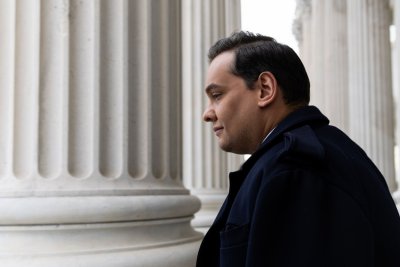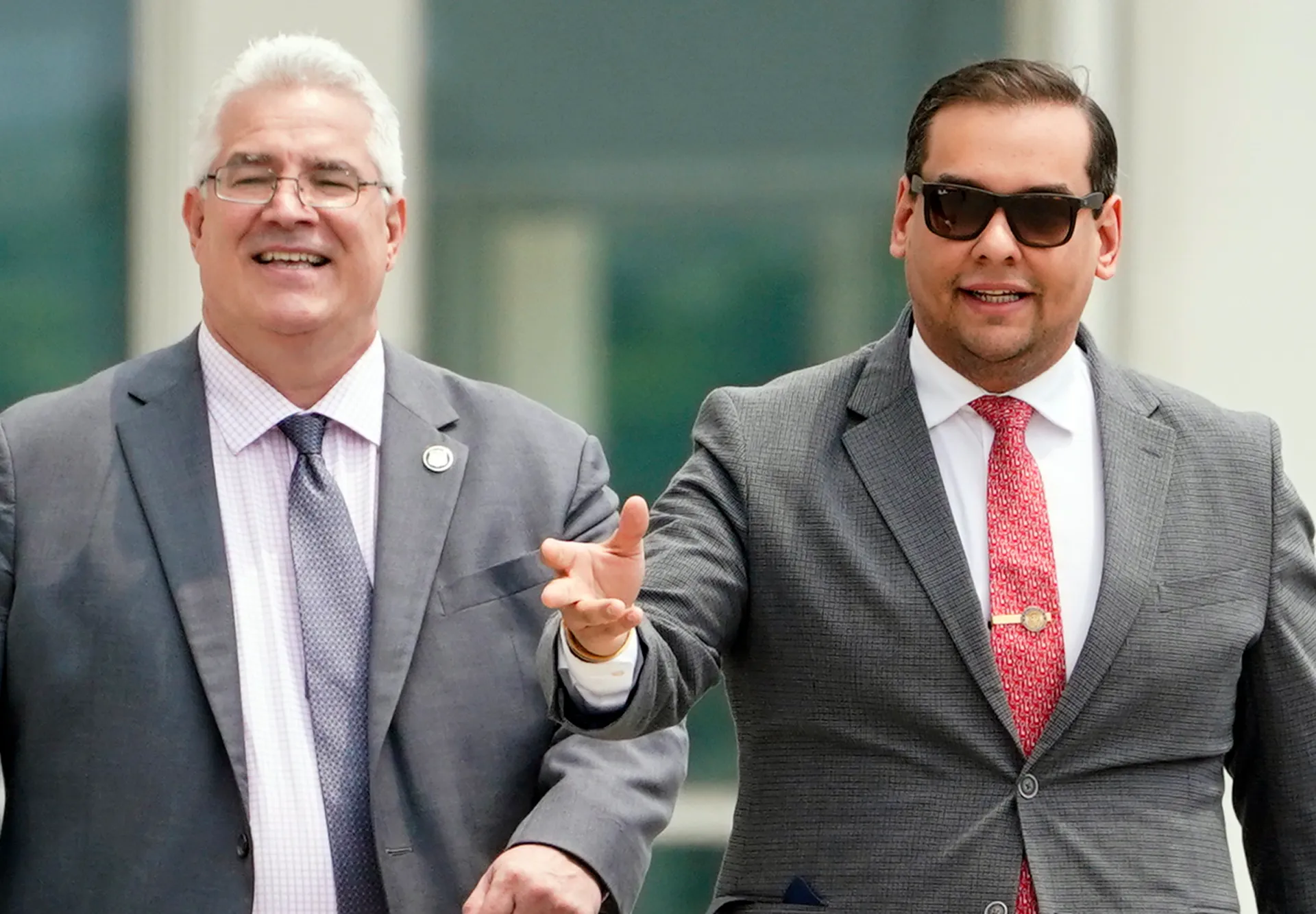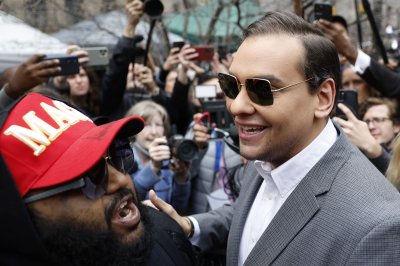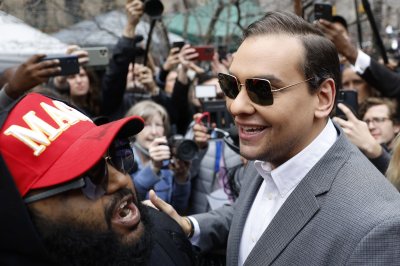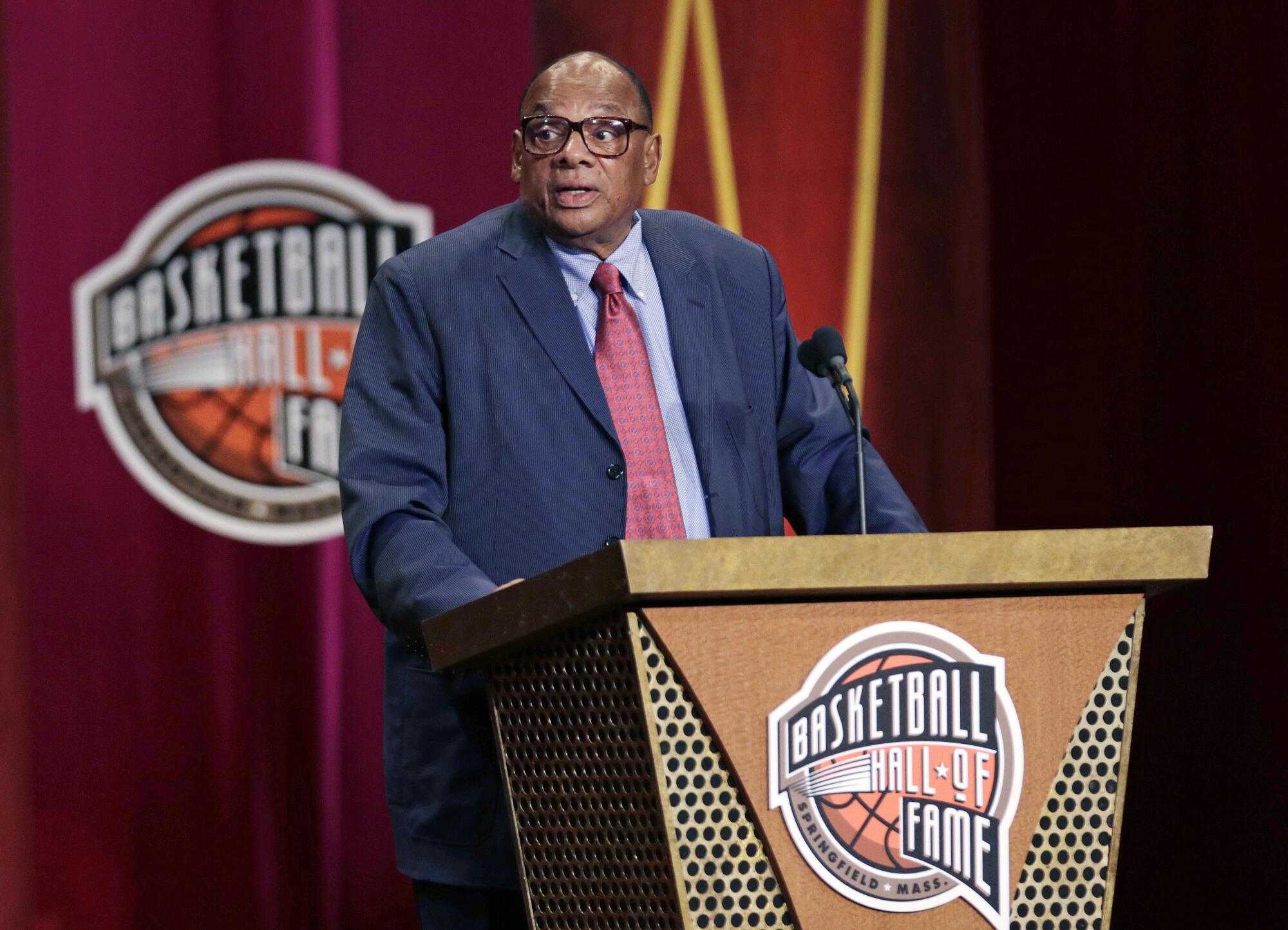She shops for groceries at a neighborhood supermarket in suburban Sacramento, usually in the company of a plainclothes state policewoman who could pass for her sister, and for months she went unrecognized. Only lately have people begun to take note of who she is.
As First Lady of California, Gloria Deukmejian might have passed her shopping list on to someone else, but she said no thanks , she preferred doing the family marketing herself–as the woman who is listed on the Deukmejian joint tax return as “housewife” has always done.
When their 18-year-old son, George, the second of their three children, went to UC Berkeley last September, Gloria Deukmejian, like any mother might, visited the dormitory room he had arranged to share with two friends, and encountered other students who rather excitedly wondered whether she had heard the governor’s son was going to be staying on their floor. Why no, she hadn’t, she said at first, straight-faced.
Parents’ Night And when it came time for Parents’ Night at Rio Americano High School, where their youngest, Andrea, who’ll be 16 next month, is a sophomore, the state’s First Couple stood in line–like everyone else. So unassuming were the Deukmejians that another mother, who had been in a rush, didn’t realize she had accidentally bumped into them until the principal announced he was “honored to have Gov. and Mrs. George Deukmejian” in the audience–and they stood up.
Such is the low-key, low-profile life style of Gloria May Deukmejian, who pursues privacy with the same driven intensity that her husband has courted votes for two decades.
Now, after California’s eight mate-less years under former Gov. Edmund G. Brown Jr., she has become successor–an Administration once removed–to the peripatetic Nancy Reagan, who even then was forever at her husband’s side and in the public eye.
Yet despite George Deukmejian’s 22 years in public office–four in the Assembly, 12 in the state Senate, four more as state attorney general, and with his current four-year term half over– she is still Gov. Deukmejian’s wife who?
Meet Gloria Deukmejian–at 52, she has been married to George (whom she had met at a big family wedding) nearly 28 years–and the most striking thing, indeed the surprise, is her sense of humor. It is quick, spontaneous–and rather irreverent.
She’s somewhat taller than you might expect, a solid-looking 5-feet-6 or so. Photographs, however, do not do her justice. They fail to reflect her vivid coloring: merry black-brown eyes, apple cheeks and flawless olive skin. She has the kind of looks a slash of bright red lipstick only enhances.
B.T. Collins, Brown’s last chief of staff, a Republican, now executive vice president for Kidder-Peabody in Sacramento, experienced her humor more than a year ago. They had corresponded, mentioning a lunch, and at one point she hand-wrote: “I would like to meet you but George won’t let me. He thinks you’ll corrupt me–but then I don’t always listen to George!” And they lunched.
‘Surprise Roaster’ She also floored them at a roast of her husband in Sacramento–a benefit dinner for the Coro Foundation, a national public affairs training program, and the California Journal, a magazine about governmental affairs. The “surprise roaster,” the presumably staid Republican’s wife, more than held her own against the likes of State Treasurer Jesse Unruh and State Atty. Gen. John Van de Kamp.
Donning a Groucho Marx mask–a jab at the dark, mustachioed lineup of her husband’s top aides–Gloria Saatjian Deukmejian, first-generation Armenian-American like her husband, told how George was a man who “never forgets birthdays or anniversaries.” One year she got a screwdriver, another a wrench set. “As a result I have a complete tool set.”
The governor was surprised. So, perhaps from another point of view, was the audience. “She stood up there against her image,” recalled 31-year-old Robin Kramer, Coro’s director and a former aide of the Southern California Democratic Party. “I didn’t know her at all, other than she was this quiet, churchly lady who lived in Long Beach. She was not timid, and she was not square.”
Nor did she appear intimidated Dec. 5 on “Look Who’s Talking,” a morning television show, part listener call-in, part interview, on KCRW, the Sacramento NBC affiliate. In her first, and, thus far, only solo television appearance, she defied image by talking about an issue–speaking out, as her husband had in a press conference the day before, on behalf of the death penalty–while sidestepping questions on government cutbacks.
‘Just Moved In’ And she candidly discussed her husband’s future. A second term? “Of course,” she smiled. “I just moved in.” Beyond the governorship? “We’ve really given many many years to political office. I think not . . . one more term and I think it’s our turn (to relax).”
Yes she had heard, “they do have a house in Washington, a little different than ours,” and smiled. And she’s not interested? “No, not at all.”
The next day in the anteroom of the governor’s office in San Francisco, Gloria Deukmejian was back to her image–the self-described “traditional wife.” Her voice is mellow, soothing. At times her answers sound almost memorized.
“I just believe in everything he does, and I just believe that anything I can do to further the cause I will do.”
Do they ever disagree on issues? “Oh occasionally–but I’ll never tell .”
Traditional Role Has she ever tried to sway him? “Have you ever tried to sway an attorney over to your side? . . . “
Elaborating on the traditional-wife theme, Gloria Deukmejian, an art school graduate, who came of age before Gloria Steinem had a cause and women’s liberation a name, said she simply feels “more comfortable” with the traditional. “Like family, three teen-agers (actually Leslie, the oldest, a junior at the University of Colorado in Boulder, turned 20 last September), dogs (three beagles), neighbors, organizations, some relating to the family, some relating to volunteer work . . . like the Bluebirds, Campfires, oh yes PTA, I put my time in all those things.”
No Interviews at Home As comfortable as she is at home, she does not allow interviews at home, whether in Sacramento or her native Long Beach. Home is for privacy, for family. As the governor’s wife she’s been interviewed in his Sacramento office, in the sunny glass-encased coffee shop at the Long Beach Hyatt Regency or in Long Beach’s St. Mary’s Community Hospital gift shop, still dressed in her pink volunteer’s smock. And she just about never allows more than 45 minutes.
She is easiest talking about family. “Our oldest is majoring in communications and she is interested in the public relations aspect. Our youngest daughter, at 15, I don’t think too many of them know what they want to do, other than meet Rick Springfield, Matt Dillon and all those people. She can be very dramatic at times. And our son, he doesn’t know what. . . . They are sort of very independent thinkers.
“We’ve been fortunate, we’ve never really had any great problems with them,” she said in response to a question.
She said she does not know what she has done right. “I have heard of people doing the same thing as I. It hasn’t happened that way for them.” But she added with a laugh that she knows how to say no. “They say I know how to say no too often but you can’t be afraid to. . . . Later they respect you for it. I’ve had comments come back.”
Like Betty Ford, Gloria Deukmejian has had the burden of raising her children much of the time on her own. Only the governor’s wife never viewed that–or their commuter marriage–a burden.
Baby Comes Early For about a decade, from the time Leslie was of school age until George Deukmejian got elected attorney general and used the Los Angeles office as his base of operation, she raised the children from Monday morning through Thursday nights, and sometimes Friday during the legislative session. When it came time to give birth to Andrea, her next-door neighbors drove her. The baby was earlier than expected, and George, a state senator then, was in Sacramento.
It is like a litany among family and close friends, that most protective network that surrounds Gloria Deukmejian, and you hear it constantly: Gloria never gets angry or upset. Gloria never complains–be it about parental burdens or her husband’s rather paltry (by comparison to other states) $49,100-a-year gubernatorial salary, or vacations spent in their Long Beach backyard. “She doesn’t bitch,” said Darlene Thornton-May, the former next-door neighbor and one of her closest friends. Anna Ashjian, Deukmejian’s sister, said the last real vacation they had was in Hawaii where he had a speaking engagement “and they took the kids.”
Alice Deukmejian, who will be 87 on Valentine’s Day, said it best: Gloria, she said upon her son’s election two years ago, has “the patience of Job.”
As the parent at hand, as her own mother was to a degree when she was growing up, Gloria Deukmejian became, of necessity, the stricter one–while carrying out the general’s orders. “And also George, he’s very softhearted, especially with the girls. . . . It’s funny,” she said with a smile. “I can raise my voice. I would have to do it several times. When George raises his voice, he has that very deep voice. Only once ! Just like with the dogs. Same way. They listen to him.”
The middle child and only daughter of the late Krikor and Mary Saatjian (pronounced Say-chen), Gloria Saatjian was born Nov. 1, 1932, in Long Beach and, though raised in a traditional way, hardly came from an average immigrant family.
Her father Krikor, a carpenter’s son who grew up in Aintab, Turkey, graduated with honors from Yale, Class of 1914, became a civil engineer, worked on the Panama Canal, and for most of his career was a middle-management executive in the purchasing department at Texaco in downtown Los Angeles–and an active member of the Petroleum Club in Long Beach.
Today, Gloria Deukmejian’s elder brother Clarence Saatjian, 56, is chief of thermal power engineering for Southern California Edison, and her younger brother, the Rev. Lloyd Saatjian, 50, is Santa Ana district superintendent of the United Methodist Church, responsible for 57 congregations in the Orange County area. (As minister of a Palm Springs congregation for 17 years, he was in the Coachella Valley in 1968 at the time of the table-grape boycott in the dispute between the growers and Cesar Chavez and his migrant farm workers. In the critical years between 1970 and 1973, Saatjian served as mediator. He still is the arbitrator on certain contracts.)
Graduates of USC Both Saatjian brothers are graduates of USC.
Gloria had an interest in art that included years of piano lessons and classical recitals–Lloyd has said she might have become a concert pianist. After graduation in 1950 from Long Beach Poly High School, she went to the old Chouinard Art Institute in Los Angeles and completed the three-year course in interior design. “Then I got out and never did pursue it. I guess I just didn’t have that real interest. . . . Someday, maybe, I’ll get back to it.”
Instead, having already taken some typing and shorthand in high school, she took a job as a secretary for Howard Zink Seat Covers, a large car-seat upholstering company in Long Beach. She worked there for several years until just about the time she met George.
Diane Hansen Roslee, a Chouinard classmate who was maid-of-honor at Gloria and George’s wedding, noted that it wasn’t easy getting a job in the art world in the ‘50s. “So she went to work for the seat-cover king. Closest to home was the easier thing to do. They (the family) didn’t want her to live in an apartment or something, because the family was so close. And she was perfectly happy. . . . Gloria was more domesticated.”
Occasionally while at Chouinard, said Roslee, who owns a dress boutique south of Tucson, Gloria would “spend the weekend with me at my apartment. But they (the family) were very protective of her. They made sure she was a good girl. . . . “
Five Languages Krikor Saatjian, who came to America in 1911 as a scholarship student, spoke five languages–Armenian, Turkish, French, English and German, his English learned from a Christian missionary–and helped pay his way by working in the school cafeteria.
During that early period, he also served with the Army Corps of Engineers at the Panama Canal. Meanwhile in 1915, back in his hometown, his family was being dispersed, and worse, during the Armenian massacre. He volunteered for service in France during World War I, rose to the rank of sergeant, and while in the Army found his mentor in Clarence Olmstead (for whom his eldest would be named). Olmstead brought him to Texaco.
The war over, Saatjian, the eldest of four brothers, set about bringing his family to America. The immediate family had escaped the massacre, but as Eddie Saatjian, the youngest brother, recalled: “After the war was over we returned home. . . . The rest of the family were either gone or dead, or we didn’t know where they were.”
On Gloria’s mother’s side today are uncles, aunts and first cousins living in Beirut.
In 1921, Krikor brought his brother Charles; in 1923, his mother, Sadie; the last two brothers, Jack and Eddie, and in the party his future wife, Mary, a distant cousin 13 years his junior, whom he married a year later– after she started learning English.
After settling briefly in Lockport, Ill., where Olmstead ran a small Texaco refinery, Texaco bought California Petroleum, “and within less than a year,” Eddie recalled, “we were here, the whole gang of us.”
Throughout the Depression, none of the brothers was without a job, and there was always a decent car in the garage. By 1941, the car was a Cadillac. Until they married, Krikor Saatjian’s brothers lived in his house, a large Victorian-style 2 1/2-story frame house on a corner in central Long Beach.
Until her marriage, Gloria Deukmejian shared a bedroom with her grandmother Sadie. In 1941, when Eddie and Alice Saatjian married, there was a portent for her own future. Before coming to California to meet Eddie, Alice Saatjian lived across the street from the Deukmejian family in Menands, N.Y., outside Albany, the state capital. She remembered George, “a beautiful, handsome boy. He had rosy cheeks.” In this intertwining of family-tree branches, Alice also was a second cousin of Isabelle Melkasian. It was at Isabelle’s wedding in San Marino on May 27, 1956 that Gloria and George met. Isabelle’s mother knew the Deukmejians too. (George and Gloria were married Feb. 16, 1957. His sister’s husband, Noubar Ashjian, is Gloria’s second cousin once removed.)
Mary Saatjian–the person Gloria Deukmejian had been closest to, the woman she confided in and is said to emulate–provided the warmth. “An Armenian mother who cared for her children . . . a saint,” said Lloyd. “An amazing cook. She didn’t have the education my dad did, but her relationship to her children and anyone who came into our home was one of love, caring and generosity.”
With her husband at work from 6 in the morning until 6 at night, she was “the one we told the bad things to,” said Clarence, “she was our confidante.”
One gets fleeting, cozy images of Gloria’s girlhood. Isabelle remembers taking the Red Car down to Long Beach with her twin, Annabelle, for weekends at the beach, and Gloria at 10, a junior bridesmaid at her Aunt Alice’s wedding in their home, getting out the carpet-sweeper to clean up a batch of the inevitable pistachio nuts. And whenever the Saatjians would visit her house they would pile out of the Cadillac bearing a box of See’s candy.
Lloyd remembers her getting up early in the morning, before anyone else in the house, practicing piano, and accompanying him at recitals while he played the violin.
And Diane, for whom Gloria would name her third child, Andrea Diane, remembers weekends at Gloria’s house:
“Every time I would come, her mother would tell us our fortunes. She always made something special–meat rolled up in grape leaves and a dessert, baklava, and after dinner, over Turkish coffee, she would tell us our fortunes. Later I realized she knew everything that was going on in our lives, and what we wanted to hear something about a tall, dark, handsome stranger that was coming into our lives.”
Diane also remembered how Gloria would have a new dress before big family weddings, because invariably there was someone they wanted her to meet. The girls never talked politics.
“I happen to come from a Middle Eastern heritage and ancestry. In my background and culture . . . ladies were always sort of kept in the background,” Gov. Deukmejian was saying lightly at a reception honoring his women appointees. “The husbands would go out in front and the ladies would follow behind; they would take care of the things at home. . . . It was always a very peaceful relationship.”
Deukmejian was explaining why Gloria was not in attendance. The joke was that ever since his wife had seen Queen Elizabeth walking ahead of Prince Philip on the royal visit to California, and had spoken about it, he wasn’t taking her “to any more of these.”
The joke notwithstanding, the Deukmejians always had that peaceful relationship.
In the first two years of their marriage, he worked as a deputy county counsel before setting up his own practice. They lived in a small apartment near the Crenshaw district for about a year, and she took a job as a secretary in the public relations department of the California Bank.
Moved to Apartment Later, they moved to an apartment in Long Beach, and she “commuted from Long Beach to Los Angeles. After a while there was the traffic and all, it was very tiring . . . “ and she quit. In 1959, Deukmejian opened a law office in Belmont Shore. The Ashjians remember that Gloria’s father bought Deukmejian his desk. Meanwhile, he plunged into community life, becoming active in the Lions. And she joined the Lady Lions.
In 1960, they bought the rather modest house they still live in Belmont Shore–today driving past one sees a mustard-colored house, second from the corner, with a large picture window and lamp in front.
Her husband’s entry into politics came as a surprise to Gloria Deukmejian. “There wasn’t any mention of politics at the beginning.” But she went along. As she said on the Sacramento television show: “I just said, ‘Whatever you would like to do.’ It’s better to have a husband happy at the job that he’s doing, doing something that he enjoys.”
She’s very much in tune with his career. Ask in the private interview what about it has given her the most satisfaction, and after saying she doesn’t “know where to begin there ,” she talks about his “transformation” of state finances from deficit to surplus. And the biggest disappointment?
A Lost Race “Losing the one attorney general’s race years ago. Remember that one? It was a four-man (GOP primary) race, and that was the last (loss).”
Gloria Deukmejian is down-to-earth, unpretentious, the same person she has always been. “I don’t think you will hear one negative”–it is all a constant refrain. She doesn’t drink–”if you see a glass in her hand it’s tonic or diet soda,” said Aunt Alice. She doesn’t swear. And she is content.
“I don’t think Gloria feels she’s given up anything,” said Joan Lucas, wife of Judge Malcolm M. Lucas, Deukmejian’s first, and, thus far, only appointment to the California Supreme Court. “She’s a very happy, secure person. I’m sure she has a lot of problems that she doesn’t discuss; but I can’t think of her having any big problems.”
Joan Lucas has known Gloria casually since high school and better since their husbands formed Lucas, Lucas & Deukmejian in 1963. “She doesn’t discuss other political people or wives, or anything like that, ever. Gloria is a very refined person, very classy–and closemouthed. “
She is an excellent listener. “She’s always a lady,” said Willie Tauscher, a fellow hospital volunteer who’s known her 20 years.
“I’ve had a great deal of trauma over the years,” said Darlene Thornton-May, “and there is no more stauncher friend. When I get down, she’d say, ‘You do what you have to do.’ ”
There is a genuine niceness. When decorators Dennis Murphy and June Given first went up to see the Sacramento residence–purchased with surplus funds from the governor’s inaugural and which will be given to the next governor and successors, or sold with the proceeds going to charity–she met them at the airplane gate. Moreover, said Murphy, though she wanted to move in during the last week in August to prepare Andrea for school, “she never once applied pressure about getting it done unlike a lot of clients.”
When she hosted the luncheons for the Western governors’ wives in Palm Springs she went out of her way to invite others along who had helped her make the social events a success. And when her mother was dying in December, 1983, she stayed at the governor’s side to host the annual Christmas party before rushing to the Long Beach hospital. It was the same kind of “devotion to duty” her own mother had practiced in preparing the elaborate funeral feast after Krikor Saatjian had died 1 1/2 years earlier at 92.
As much as anything else, Gloria Deukmejian is a private person. After her mother’s illness, Aunt Alice took over the role as chief confidante. “If there were things to complain about,” allowed Alice Saatjian in connection with the search for the gubernatorial home, “we used to talk. It didn’t go out from my house; it didn’t go out from her house.”
California’s First Lady is by all accounts an excellent cook. She likes to golf, needlepoint, garden. She reads Erma Bombeck, and watches “Hill Street Blues” and “60 Minutes.” She hates the soaps. She plays the piano, Mozart still her favorite. But Gloria Deukmejian plays only for herself. “When I was growing up and took piano for over 10 years, I had a recital every month and had to memorize so I played for enough people I think.”
Time with the governor’s wife is nearly up. She grows fruit, vegetables? “No flowers . . . just whatever you think.”
Toward the end she had been asked to define Gloria Deukmejian. “Being myself. My door is open for coffee to friends who want to stop by. Just because I’m First Lady doesn’t mean the door is locked. And just doing the things I’ve always done. Shopping. . . . It’s just life as usual; it’s just that my husband has a different job. . . . We’ve always kept a low profile.”
May we come by for coffee?
“Leave your pad behind,” she said.
